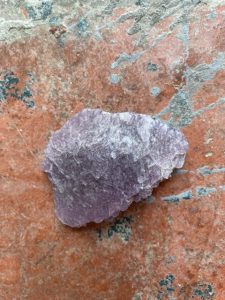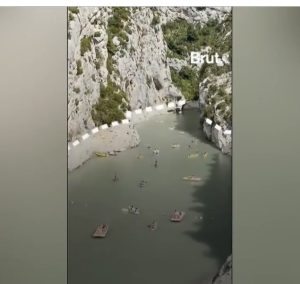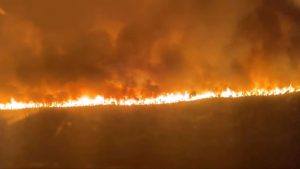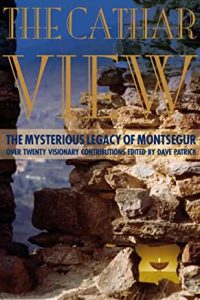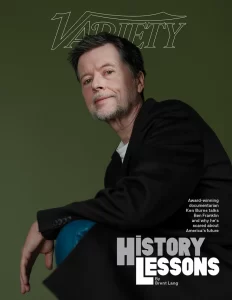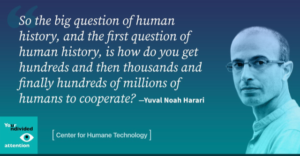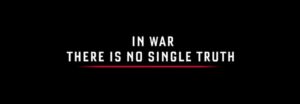Ken Burns
Dayle in Limoux – Day #36
August 10, 2022On my brutal heat hike to Rennes-les-Chateau on Mary Magdalene’s feast day I lost my prayer/meditation amethyst. It was in my pocket. When I found shade I would stop and rest and I think it dropped out. On the 5th, when I was back and in the book shop, I found a new stone…a crystal…called LEPIDOLITE.
So beautiful. I call it my ‘Alma’ stone, for my great-grandmother, whom I adored.
The Lepidolite name comes from the Greek “lepidos” meaning “scale”. It almost looks fossilized.
It can be found in Brazil, Peru, Russia, Afghanistan and Madagascar. The book shop clerk, Adrian, believes this particular stone is from Brazil.
‘Spiritually, this crystal alone makes any kind of negativity disappear. It contributes to the development of the spiritual senses. It makes it possible to bring out one’s higher self. This stone favours the stimulation of the spiritual senses and the development of the soul. It allows you to have spiritual insight and to be able to interpret the various situations of everyday life. It also helps you to reach higher levels of consciousness and to understand unusual events.
Concerning the chakras, lepidolite opens the heart and throat chakras. (I love. I speak.) It is known to dissipate misfortune and remove blockages while stimulating the third eye (Ajna, I see). It is a purifying stone.’
ℒℴve.
The heat wave continues. So do the fires, evacuations and drought here in France.
From FRANCE 24.
‘The Loire, the Seine, the Rhone, and the Meuse are the names of some of #France’s 🇫🇷 famous rivers that are almost unrecognisable this summer as drought and #water shortages persist.’
From The Independent:
‘Renewable energy can end the energy price crisis and energy security crisis. We can make all the energy we need right here, priced permanently low. There is no global commodity price for wind energy, it gets used where it gets made and we can take a big step towards net zero. We could do this in ten years. Five if we reflected the genuine urgency of the situation. [Jai to that.]
We have all the tools we need; the technology, the economics, public support. We lack only one thing; politicians (in charge) that get it.’
Also from The Independent:
‘The impact of heat is cumulative, and the body only starts to recover when it drops below 80F.
Scientists warn that dangerous heatwaves will become more frequent and unpredictable unless sweeping action is taken to stop burning fossil fuels and curtail global heating.’
Some heat waves have names now. That could save lives.
Treating heat waves more like hurricanes could help us take them more seriously.
by Neel Dhanesha
“Naming hurricanes has been really effective,” said Kathy Baughman McLeod, director of the Atlantic Council’s Adrienne Arsht-Rockefeller Foundation Resilience Center (Arsht-Rock), which studies climate resiliency. Hurricane-prone communities tend to have what McLeod called “a culture of preparedness and prevention,” where residents know how to prepare for storms of varying intensity. Residents who decide to ride out a weaker storm at home, for example, might board up their windows and store a few days’ worth of water. “Heat waves need that branding, that identity,” McLeod said.’
From Reuters:
‘A huge wildfire that has destroyed more than a dozen homes and forced the evacuation of thousands of residents, some of whom had clambered onto rooftops as the blaze neared, was sweeping through the Gironde region of southwestern France on Wednesday.
More than 1,000 firefighters backed by water-bombing aircraft were fighting the fire that has razed more than 6,000 hectares and is still burning out of control.
Advertisement · Scroll to continue
France, like the rest of Europe, is struggling with successive heatwaves and its worst drought on record. Dozens of wildfires are ablaze across the country, including at least four other major ones.’
Having lived through two major wild fires in Sun Valley, Idaho…evacuations; when the wind picks up here in Limoux like today combined with the heat, it is very concerning.
︶⁀°• •° ⁀︶
I learned that the building I am living in was once occupied by the Nazi’s during WWII. The man who sold the structure to the current owner remembers hearing their boots on the stairs. He lived here for 90 years. We don’t know how old this building in because the newest owner told me France doesn’t reveal that detail in ownership exchanges. In the various books I’ve picked up recently about this Languedoc region, I’m learning about Hitler’s obsession with the Grail and the Cathars. Marking the Jewish clothes with mandatory Star of David crosses was learned from the Crusades and the Inquisitions during the 12th and 13th centuries, when Cathars were ordered to wear the double yellow cross on their clothing.
I remember learning about his presence during the war at the medieval city and fortress of Carcassonne the first time I was in the region. Apparently his troops were ordered to dig deep in an old well in hopes of finding treasure, the Holy Grail.
From the book ‘The Manuscript’ by Lars Muhl:
‘We all take part in the cruelty of the world. Even when we think we know nothing about it. We all carry a Hitler and a Yeshua [Duality] in us. At one time or another each person must stop and face his own failures and cruelties’ [p. 135].
From the book, ‘The Cathar View’, edited by Dave Patrick:
‘There has been a Caharism for every generation – – including today’s consumerist society, not just those who seek a new spirituality’ [page 24].
‘Cathars who confessed their allegiances or who were released after interrogation were made to wear two yellow crosses sewn onto their clothes and often forcibly relocate to ares in which there was no heresy. Usually such survivors were Believers., the Perfects were burnt. […] Although it has become popular in modern imagery as an icon of sympathy with the Cathars, it was near reclaimed by the Cathars as their own symbol’ [p. 31].
Cathars considered the cross a symbol of Rex Mundi when encountered as it was a representation of evil [worldhistory.org]. The cross, they claimed, was nothing more than a symbol of world power.
More from ‘The Cathar View:’
‘Peter Maury, the priest of Montaillou, accepted bribes to ignore Cathars who were not wearing their crosses’ [p.31].
A Nazi researcher by the name of Otto Rahn, was sent to Southern France to learn more about the Holy Grail, which the Nazi’s believed was an actual jeweled artifact. He visited in ’31 and again in ’37. He and his cohorts believed that in finding the ‘Grail-stone containing the secret of the origin of the world, they would learn the teaching about the Aryan race that had been los, then found, and finally hidden by the Cathars in the fortress of Montsegur.
In his book ‘The myth of the Twentieth Century, Alfred Rosenberg, it is the ‘awakening of the race soul, which after a long sleep, victoriously ends the race chaos. […] Under the sign of he swastika unchains the racial world-revolution.’ Hitler was a fan. He gave his ‘enthusiastic appraisal of the book.’
[The mission of Otto Rahn at Montsegur, by Cunha Alvarenga.]
It will be interesting to see if Ken Burns covers this part of the Nazi history when he debuts his new documentary on PBS, September 18th.
Here’s the trailer.
https://www.pbs.org/video/us-and-holocaust-trailer-hlj3aj/
And a quick update on Amnesty’s dreadful decision to publish their tarnished and erroneous report on Ukraine war activities.
From the Kyiv Independent:
‘Swedish co-founder leaves Amnesty due to controversial report on Ukraine. “I have now been a member for almost sixty years. It is with a heavy heart that I, in view of Amnesty’s statements on the war in Ukraine, ending a long and rewarding commitment and rewarding commitment.”
Amnesty International triggered a scandal by publishing a report on Aug. 4 claiming that Ukrainian troops are endangering civilians by deploying weapons in residential areas. Oksana Pokalchuk, head of Amnesty International’s Ukrainian branch, also resigned in protest.’
Same. Right on.
À bientôt.
❀
“This is not okay.”
February 18, 2022Written in response to SpaceX/Tesla founder Elon Musks comparison to Hilter and Canadian Prime Minister Justin Trudeau on social media yesterday. [The meme will not be posted here. -dayle]
From from author and former CBS news anchor Dan Rather:
“To see this face [Hitler] staring back at us, with a message like this, is absolutely beyond the pale of any civilized communication. I think of the millions dead. I think of a world destroyed. I shake with anger. The pit of my stomach is sick. I am deeply saddened.”
From his blog, Steady:
“On the individual level this raises serious concerns about Musk, whose public pronouncements have become increasingly strident and aligned with fringe political actors. Meanwhile, his company Tesla is being sued in California for racism.
The opprobrium Musk is getting is well warranted. His behavior raises many questions. Will it hurt the popularity of his Tesla cars? What will it mean for his SpaceX company’s contracts with NASA? Or, will anyone really care? Is this all just normal now, within the spectrum of what is considered “acceptable”?
I am confident that the vast majority of Americans and people around the globe find this rhetoric reprehensible. Just because you are a feted centibillionaire (a new word for those in the $100 billion club) doesn’t mean you can get away with this outrageousness. When people rise up and say, “No,” “This is not okay,” “We will not let it stand unchallenged,” the world has no choice but to pay attention. There can be swelling choruses for good. Public pressure can lead to better outcomes.”
Musk eventually deleted the meme later in the day.
Full essay:
“Is this all just normal now, within the spectrum of what is considered ‘acceptable’?”
-Dan Rather
dayle: Thinking of this in context of seeing a clip of a photographer fall off a six-foot stage in LA while capturing a photo of the Rams quarterback and his wife at a victory celebration. The quarterback saw it and turned his back, not offering to help or ask for assistance.
Considered in larger context, how is the vitriol, hate, anger, and neglect centered in social media affecting our sense of collective compassion and kindness? Is being called out for turning his back the reason the couple is offering to pay the photographer’s medical bills? As documentarian Ken Burns shared in an interview with variety this week about his concerns for the U.S.,
“My whole question to America is where do you want to live?” says Burns. “This is a simple choice between Bedford Falls and Pottersville. Do you wish to be a community in which everyone is bound to each other and enjoys the blessings of liberty and free speech and freedom to assemble and religion? Or do you wish to live in an I’ll-get-mine Pottersville, in which everything is degraded and corrupted.”
Full interview:
Unity?
January 19, 2021Documentary film maker Ken Burns:
“I used to think there were three great crises: the Civil War, the Depression and the Second World War in American life. I would add this. And maybe this is the very, very worst. But at the same time, we just keep going forward. There is no other option but to endure.” [NPR]
‘Well, darkness has a hunger that’s insatiable, and lightness has a call that’s hard to hear.’
-Indigo Girls
American politics has reached a moment of existential uncertainty. Beyond the headlines and news alerts are problems bigger than any one administration—problems that stem from the deep tensions and challenges in America’s political institutions.
It’s time to reevaluate and revisit how we think about American democracy. The Founding Fathers did their best, but the hosts of a new podcast, “Politics in Question,” have some ideas, too. They discuss political reforms in this first-of-its-kind show that asks the very biggest questions.
Join hosts Lee Drutman, Julia Azari, and James Wallner, three lively experts on American political institutions and reform, as they imagine and argue over what American politics could look like if citizens questioned everything.
There are a lot of podcasts about the daily chaos. But “Politics in Question” is the first to step back and think big about the basic structures and processes of democracy — and to take nothing for granted.
This podcast is part of The Democracy Group, a network of podcasts that examines what’s broken in our democracy and how we can work together to fix it.
“From all the thoughts of ‘I’ and ‘man,’ that man finds utter peace.”
Bhagavad Gita
Dear Dayle,
The extremist behavior and violence that took place in Washington, D.C. on January 6 was truly shocking and worthy of condemnation—many have already done so. The whole world is transfixed, bearing witness to the awful and extraordinary unfolding of history.
In my previous letters I wrote about the DISORDER that is already upon us, as well as the consequences that ensue when illusions of power and privilege co-opt and distort Christianity. At the Center for Action and Contemplation, we are free to speak in great part because we are not beholden to the usual constituencies. Using the brilliant metaphor from the Hebrew Scriptures, we are “outside the camp” of either political party, any need to influence an election, and, by the grace of God, any negative or fear-based church pressure from Rome, Santa Fe, or Assisi.
We are also, like few other organizations, free from the coercion of donors and finance, thanks to almost thirty-three years of operating with our priorities clearly in view to all who cared to study or read our publications. Blessedly, our donors have not run for cover over time, but only increased in numbers, continuing to join us—even from outside the usual camps of both religion and politics.
Few people enjoy such freedom of living and teaching from the edge of the inside. This is the unique position that a prophetic charism holds and for which it is responsible; it is structurally quite rare, and therefore we must use it.
“Moses used to take the tent, and pitch it outside the camp, at some distance from the camp. . . . Anyone who wanted to consult Yahweh would go to this tent of meeting outside the camp.” (Exodus 33:7)
The “tent of meeting” is the initial image and metaphor that eventually became our much later notion of “church.” Moses had the prescience and courage to move the place of hearing God outside and at a distance from the court of common religious and civic opinion—this was the original genius that inspired the entire Jewish prophetic tradition. It is quite different than the mere liberal and conservative positions, and often even at odds with them. Most of liberalism is based on a secular foundation of knowledge, and most of conservatism is identified with boundary-keeping, order, and control. By contrast, Prophecy and Gospel are rooted in a contemplative and non-dual way of knowing—a way of being in the world that is utterly free and grounded in the compassion of God.
The early desert fathers and mothers imitated both Moses and Jesus by fleeing to Egypt, Syria, Palestine, and Cappadocia—and some as far as Ireland and Scotland. Beginning in the 4th century, we Christians surrendered our unique and free perspective to the Roman and Byzantine Empires. In the desert and outside the camp, these people discovered what we now call “contemplation”: the alternative mind and the alternative community to the status quo—then and now—of money, power, and war.
The free and graced position found in the tent of meeting is what allowed Jesus and all prophets in his lineage to speak from a minority position. It is always less desirable, compared to the comfortable and enjoyable places at the center and the top; yet it is the Jesus stance, and the place where all Franciscans follow after him.
“Let us go to him, therefore, outside the camp, and be willing to share in his degradation.” (Hebrews 13:13)
For many people, religion as a “cosmic egg” capable of holding universal Truth, collective and personal meaning, is broken. Now, the cracks in this very “uncosmic egg” are rapidly spreading in all directions. Delusions enthrall us and inherent deceit becomes overwhelmingly apparent and manifest in the nihilism of our postmodern age, the denial of science and reasonableness, and the denial of the pandemic that now assaults us all. The very future of the meanings of words and truth are at stake, as specifically exemplified by Trumpism in its many forms.
We must again move with Jesus outside the camp and even be willing to “share in his degradation” if that be God’s will. We must trust that the one who has called us into this present moment will also sustain us and lead us through it.
“Yahweh would speak with Moses face to face [outside the camp] as a young man speaks with his friend. And then Moses would return to the camp.” (Exodus 33:11)
This is the primary vocation of the Center for Action and Contemplation. We invite you to join us—first, in the tent of meeting outside the camp for prayer, dialogue, and deep discernment. Then, like Moses, we must all choose to “return to the camp,” where all of our brothers and sisters live and die.

Maybe unity is not possible, yet, we can remember that we are one, one in humanity as species and co-creators in our reality with ourselves and in each other…especially in context and proximity of losing our democracy, our republic, just three weeks ago. Can we pledge, at least, to cooperation? To listening? To empathy?
We are ‘we the people.’ Let us remember. And may we vow today to divest ourselves from the for-profit platforms and groups that feed disinformation and hate into our collective bloodstream. It must end.
And in less than 24 hours, the first woman vice president in the United States.
-dayle
🤍
Visceral and immersive.
September 4, 2017“The Vietnam War,” a 10-part, 18-hour documentary by Ken Burns and Lynn Novick, premieres on PBS on Sunday, Sept. 17.
There are more Vietnamese voices “The Vietnam War” than Burns at first thought necessary. … It has animated three-dimensional maps and foreign-language interviews. There’s rock music, as well as a score commissioned from Trent Reznor and Atticus Ross; Erik Ewers, a longtime editor at Florentine, who has worked on dozens of hours of film chivvied along by ragtime and bluegrass, told me, with feeling, that the opportunity to use “Dazed and Confused,” by Led Zeppelin, was “a dream come true.”
The film includes striking sequences in which well-known black-and-white photographs, always central to Burns’s work, coëxist with color film and color photography. The subject, being recent and contested—and its traumas sometimes evident in the stiffness around the mouths of witnesses—has its own narrative potency. … Still, when the narration begins, its liturgical phrasing, and its reach for a negotiated settlement among viewers, will seem familiar.
[The New Yorker’s Ian Parker]
In “Ken burns Tackles a Different Civil War,” N.Y. Times ideas reporter Jennifer Schuessler says the film “offers an uncannily well-timed reflection of our current societal fractures — a kind of origin story for the culture wars.”
- “The $30 million film, more than 10 years in the making, offers an intensely immersive, often head-spinning history lesson, combining grand sweep and archival depth with sometimes devastatingly emotional first-person interviews with people from all sides (including more than two dozen Vietnamese, from both the winning and losing sides).”
- “There are scenes covering 25 battles, 10 of which are examined from multiple perspectives.”
- “Every word of the script, written by the historian Geoffrey C. Ward, was carefully weighed. And perhaps none were as carefully debated as that opening narration, which describes the war as ending in ‘failure’ (not ‘defeat,’ Mr. Burns noted, though he used the word himself). ‘I think we probably spent six months on the word ‘failure.'”
- “As for ‘begun in good faith,’ Mr. Burns said he stands by those words, which he said reflect the intentions of those who fought the war, even if they are perhaps ‘too generous’ to our leaders.”
- Worth the click: “Shot by Shot: Building a Scene in Ken Burns and Lynn Novick’s Vietnam Epic.”
